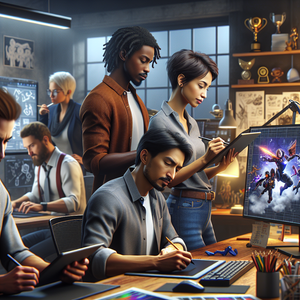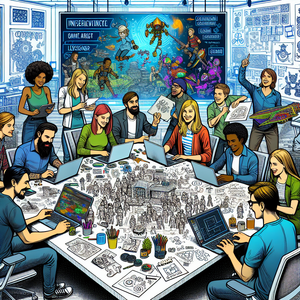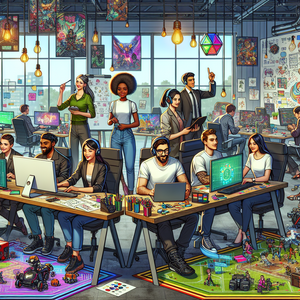
Exploring 20 Exciting Careers in the Gaming Industry: A Guide to Opportunities, Responsibilities, and Requirements
The gaming industry is an exhilarating realm bursting with diverse career paths that cater to a multitude of talents and interests. As this vibrant sector continues its remarkable expansion—forecasted to surpass $200 billion by 2023—the demand for skilled professionals is on the rise. From game development to marketing and esports management, the landscape is rich with opportunities. This evolution in technology and player expectations makes now an exciting time for both newcomers and seasoned industry veterans alike.
Job Summaries:
Game Designer:
- Game designers are the masterminds behind the gaming experience.
- They craft gameplay mechanics, rules, and narratives.
- They work closely with artists, programmers, and sound designers.
- They create immersive and engaging experiences.
- Candidates often hold degrees in game design or computer science.
- Candidates must possess a blend of analytical and creative skills.
- The demand for skilled game designers continues to grow.
Game Programmer:
- Bringing designs to life through code, game programmers utilize languages like C++ and C#.
- A degree in computer science or software engineering is typically required.
- Their technical expertise is crucial for ensuring that games run smoothly and adhere to performance standards.
- Game programmers are a cornerstone of the development team.
Quality Assurance (QA) Tester:
- QA testers are the vigilant guardians of game quality.
- They identify bugs and ensure a polished product before it reaches players.
- Formal education isn't always necessary.
- A keen attention to detail is a critical attribute.
- A passion for gaming is a critical attribute.
- The industry's expansion has increased the need for diligent QA testers.
- This role provides a great entry point for aspiring professionals.
Game Artist:
- Game artists are responsible for the visual components of games, from character models to animations.
- A robust portfolio and proficiency with tools like Adobe Creative Suite are typically required.
- As the demand for visually stunning graphics grows, opportunities for talented game artists are abundant.
Game Producer:
- Game producers are the project managers of the gaming world.
- They oversee development processes and coordinate between teams.
- They manage timelines and budgets.
- A background in project management or game development is advantageous.
- Producers play a vital role in aligning creative visions with business goals.
- This alignment is essential for a game’s success.
Community Manager:
- Acting as the bridge between developers and players, community managers cultivate a positive online atmosphere.
- Strong communication skills and a deep understanding of gaming culture are essential.
- By fostering community engagement, these managers help build loyalty and excitement around a game.
Marketing Specialist:
- Marketing specialists devise strategies to promote games effectively.
- They conduct market research.
- Manage social media campaigns.
- Collaborate with influencers.
- A degree in marketing or communications is typically required.
- Experience in digital marketing is typically required.
- As competition intensifies, skilled marketers are increasingly sought after.
Esports Manager:
- Esports managers handle the logistics of competitive gaming events.
- They manage sponsorships and event planning.
- A strong background in event management is essential.
- Knowledge of the esports ecosystem is crucial.
- The field offers numerous career paths for those passionate about competitive gaming.
Sound Designer:
- Sound designers enhance the gaming experience by crafting audio elements, including sound effects and music.
- A background in audio engineering or music production is often essential.
- As the industry expands, the demand for innovative sound designers continues to rise.
Game Marketing Analyst:
- Game marketing analysts assess trends and player behavior to shape marketing strategies.
- A degree in marketing, business, or data analytics is typically required.
- Their insights are crucial for developing effective campaigns that resonate with target audiences.
Game Localization Specialist:
- Localization specialists adapt games for various markets, ensuring cultural nuances are respected.
- Proficiency in multiple languages and experience in translation are key requirements.
- As gaming becomes more global, this role is increasingly vital.
Technical Artist:
- Technical artists serve as a bridge between art and programming.
- They ensure that visual assets are optimized for performance.
- A background in art or computer science is typically necessary.
- Strong problem-solving skills are typically necessary.
- This role is in high demand as game complexity increases.
Game Writer:
- Game writers are responsible for crafting engaging narratives and dialogue that enhance player experiences.
- A background in creative writing or storytelling is beneficial.
- Writers have abundant opportunities to create memorable gaming moments.
VR/AR Developer:
- Focusing on creating immersive experiences
- VR/AR developers work with virtual and augmented reality technologies
- A degree in a related field and experience in VR/AR development are typically required
- This area offers exciting prospects as demand for immersive technology grows.
Game Researcher:
- Game researchers analyze player behavior and industry trends to provide insights that guide development.
- A background in psychology or market research is often necessary.
- Their data-driven insights significantly influence the future of gaming.
Game Business Development Manager:
- Business development managers forge partnerships and explore new market opportunities.
- A degree in business or marketing, along with strong negotiation skills, is typically required.
- This role is crucial for driving growth in a competitive landscape.
Game Animator:
- Animators breathe life into characters and objects through movement.
- A background in animation and proficiency in relevant software are often essential.
- With the increasing demand for high-quality animations, this role offers exciting career possibilities.
User Interface (UI) Designer:
- UI designers create intuitive interfaces that enhance user experience.
- A background in graphic design and knowledge of human-computer interaction are typically required.
- This role is critical in modern game development, where usability is paramount.
Game Data Analyst:
- Data analysts leverage metrics to decipher player behavior and game performance.
- A degree in data analytics or statistics is typically required.
- Their insights help optimize game performance and player retention.
- This role is vital in a data-centric industry.
Game Marketing Coordinator:
- Marketing coordinators support the execution of marketing campaigns.
- Managing promotional materials and social media efforts.
- A degree in marketing or communications is typically required.
- This role is essential for ensuring games effectively reach their target audiences.
These varied roles showcase the wide-ranging opportunities available in the gaming industry, reflecting the multitude of skills and passions that can thrive in this dynamic field. For those considering a career in gaming, exploring current job openings and pursuing relevant education or experiences can serve as a solid starting point. With the industry's promising growth trajectory, now is the ideal time to embark on a career in gaming and join a community that thrives on creativity and innovation.
Explore More Jobs

